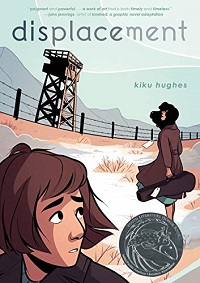Welcome to Read This Book, a newsletter where I recommend one book that should absolutely be put at the top of your TBR pile. Recommended books will vary across genre and age category and include shiny new books, older books you may have missed, and some classics I suggest finally getting around to.
Before I do that, I absolutely must tell you about First Edition, the new podcast where BookRiot.com co-founder Jeff O’Neal explores the wide bookish world. Interviews, lists, rankings, retrospectives, recommendations, and much more, featuring people who know and love books. Subscribe to First Edition on Spotify, Apple Podcasts, or your podcatcher of choice.
Today’s pick is a graphic novel that took inspiration from Octavia Butler’s Kindred.

Displacement by Kiku Hughes
In this time-travel historical fiction, Kiku imagines herself as a teen. She and her mother are visiting San Francisco from Seattle. They go to Japantown to try to find the home where Kiku’s Japanese American grandmother and her parents lived in the city before they were forced into an incarceration camp during World War II. We learn that Kiku and her mother don’t really talk about Kiku’s grandparents or her mother’s upbringing much. Her grandmother passed before she was born and she never got to know her. Kiku knows very little about her grandmother’s experiences.
At one point, Kiku’s mother goes into the mall and Kiku gets sucked back into time for the first time. She describes it as “displaced.” Once she gets her bearings, she realizes she is seeing someone who might have been her grandmother, having a violin recital. She is able to look around briefly before being shoved back into the present. Kiku gets displaced another couple of times, again, back in time to her grandmother’s experiences. Kiku ends up being in the same incarceration camp as her grandmother, age 17, and great-grandparents. Kiku quickly realizes that there is so much she didn’t know about this completely heinous act by the U.S. government and she is learning it all firsthand.
Personally, I learned nothing about this in school. The only reason I knew about the Japanese incarceration camps is because my grandmother’s half-sister was forced into one. If a person was 1/16th Japanese or more, they were forced into a camp. My family was also in San Francisco and I wonder if they were sent to the same camp as Kiku’s family. As Kiku explores, she learns there is so much shame around what happened, especially by the people who experienced it and it doesn’t get talked about in many families nor taught in schools.
I had no idea that people protested within some of the camps and that some folks refused to sign paperwork that said they would join the U.S. military. I didn’t know that there were a lot of differences of opinion between the older generations who immigrated from Japan and the younger generations who were born in the U.S. Reading this was enraging on so many levels, from the fact that this happened, to the fact that this kind of awfulness continues to happen in different ways to different groups by this same government, and the fact that most of us were taught so little about it. This graphic novel is so important and a great read.
Looking for fascinating stories, informed takes, useful advice, and more from experts in the world of books and reading? Subscribe to Book Riot’s The Deep Dive to get exclusive content delivered to your inbox.
That’s it for now, book-lovers!
Patricia
Find me on Book Riot, the All the Books podcast, Twitter, and Instagram.
Find more books by subscribing to Book Riot Newsletters.